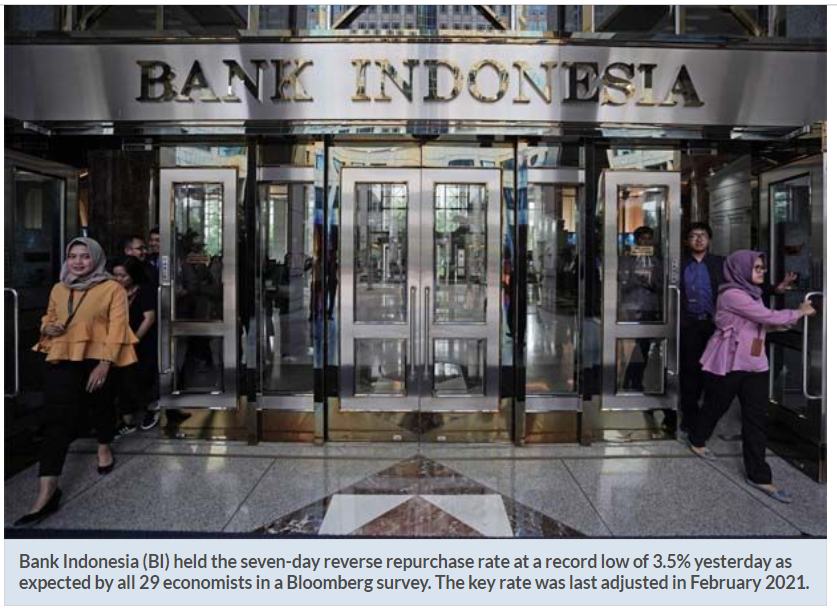Indonesia holds key rate to support an economy viewed to be slowing
JAKARTA: Indonesia’s central bank kept its benchmark interest rate unchanged to support the economy’s flagging recovery, while working with the government to manage price pressures fuelled by the Russia-Ukraine conflict.
Bank Indonesia (BI) held the seven-day reverse repurchase rate at a record low of 3.5% yesterday as expected by all 29 economists in a Bloomberg survey.
The key rate was last adjusted in February 2021.
“The decision is consistent with the need to maintain exchange rate stability and control inflation, coupled with efforts to revive economic growth despite a build-up of external pressure,” governor Perry Warjiyo said, citing Russia’s war in Ukraine and faster global monetary policy normalisation as risks.
The rupiah, which has been among the least volatile currencies in Asia, strengthened 0.1% against the dollar after the rate decision. The currency has weakened 0.6% so far this year.
Like most of its neighbours, BI is waiting for a recovery in South-East Asia’s biggest economy to take firm hold before unwinding pandemic-era monetary support.
Warjiyo signalled less urgency to start raising rates as he said the rebound in domestic demand has been more sluggish than expected, keeping a lid on fundamental price pressures.
Policy makers have pledged to keep borrowing costs low to boost bank lending as the economy reopens, even as peers in advanced economies have turned to tightening policy settings to combat inflation.
Warjiyo urged lenders to do more to boost the economy, even as credit growth rose to a two-year high of 6.65% in March.
The central bank lowered the economy’s growth forecast this year to a range of 4.5% to 5.3% from 4.7% to 5.5% earlier, underlining the need for continued support.
BI also sees global expansion slowing to 3.5% from 4.4% amid supply chain disruptions caused by the war.
“We will very carefully consider our further moves to maintain stability and support economic growth,” Warjiyo said, adding that any further monetary policy moves will depend on the government’s decision on price controls.
Indonesia has policy space to stand pat, for now, with inflation hovering below the midpoint of its 2% to 4% target band despite rising food and fuel prices.
Warjiyo said that inflation remained manageable, with the forecast for price growth kept steady at 2% to 4% for the current year, while watching for any risks from global spillovers.
“Slower growth and higher inflation mark an uneasy combination for many policy makers now,” said Wellian Wiranto, an economist at Oversea-Chinese Banking Corp in Singapore. “Despite such budding growth concerns, we expect BI to start to prioritise inflation fight” going forward.
Policy makers have reason for caution as government subsidies that kept inflation benign earlier this year are rolled back to ease pressure on the budget. Value-added taxes were also raised this month, with power tariffs possibly next.
A more aggressive tightening by the United States Federal Reserve (Fed) could add another layer of risk to Indonesia’s policy outlook.
The Fed is seen weighing a hike of as much as 50 basis points at its May meeting – a move that could spur a sell-off in emerging-market assets and weaken the local currency. — Bloomberg


 English
English




